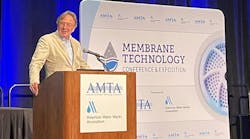CALGARY, ALBERTA, CANADA, March 17, 2015 -- Today, the University of Calgary and the City of Calgary in Alberta, Canada, unveiled the $38.5-million Advancing Canadian Wastewater Assets (ACWA) facility at the Pine Creek Wastewater Treatment Plant, where university researchers are working side-by-side with municipal operators to advance wastewater treatment technologies and knowledge that will lead to cleaner water, a better protected ecosystem and improved public health.
An idea conceived more than 15 years ago through the vision of a group of world-class scholars, ACWA is the only fully integrated, fully contained university research facility in the world located within an operating industrial wastewater treatment plant. Research conducted at ACWA will result in wastewater treatment technologies that remove existing and emerging contaminants to improve ecosystem and human health, creating clean, sustainable sources of water locally and globally.
"There is no other facility like this, and we expect it to offer groundbreaking water research with global impact. It is a place where researchers, practitioners and industry can work together to solve important problems facing cities everywhere," said Elizabeth Cannon, president of the University of Calgary. "It represents a new way of doing basic and applied science -- a way that results in true discovery and innovation that benefits society as a whole. Research of this magnitude would not have been possible without our partnership with the City of Calgary and the support of the provincial and federal governments."
The launch coincides with World Water Day 2015 on Sunday, March 22, as ACWA's purpose is closely tied to this year's theme of Water and Sustainable Development. The site includes 3.8 kilometers of naturalized, experimental streams that replicate real-life water situations and enable research that cannot currently be performed elsewhere. Their size (320 meters each), number (12) and connectivity to the city plant allow researchers and trainees to study the effects of actual wastewater effluent on living ecosystems in real-time and to influence decision-making for the City of Calgary's operational infrastructure improvements.
The facility consists of the streams; a dedicated experimental wastewater treatment plant, where methods to remove contaminants are developed and tested; and an analytical laboratory, where the biological and chemical characteristics of wastewater and treated effluents are analyzed. Three additional labs on campus at the University of Calgary also support ACWA research. The facility was awarded $10.4 million in funding from the Canada Foundation for Innovation and a matching amount from Alberta Innovation and Advanced Education.
ACWA brings together city employees and researchers from multiple disciplines to address three main themes related to water: engineering technologies, public health protection and aquatic ecology and ecotoxicology. City laboratory scientists are working together with the university at this location and also at the locations on the university's campus to develop new methods to test for emerging pathogens and substances of concern. In fact, some of the graduate students involved in ACWA research are also City of Calgary employees working in the wastewater system.
All principal investigators involved in the project also have research grants from the Natural Sciences and Engineering Research Council of Canada. "This initiative represents an impressive synergy between a city and its university," said Gilles Patry, president and CEO of the Canada Foundation for Innovation. "Researchers, municipal employees and industry partners now have access to a state-of-the-art facility at the treatment plant, where they can work together to develop new and more efficient wastewater treatment processes."
The ACWA partnership benefits the City of Calgary in many ways. The city monitors emerging trends and regulations as well as testing technologies to protect public health and the environment. Results from ACWA research will inform decision-making and leverage resources, knowledge and skills. New technologies and substances could be assessed in the controlled environment, with results directly influencing policy and regulations.
Processes refined through the ACWA initiative will have application far beyond municipal wastewater treatment. For example, they could be used to monitor water activity and quality remotely in isolated communities, and they could also lead to the development of "smart sewers" that live-monitor effluent before it reaches the treatment plant. In the energy industry, the technologies could be applied to test and treat wastewater at remote extraction or processing sites.
See also:
"Produced water evaporation system for SAGD project launched in Alberta"
"IDE joins Fair Canada to expand footprint in Alberta's water treatment, oil sands market"
###




